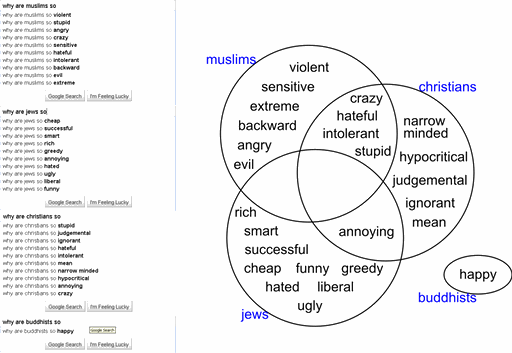The Null Device
2010/10/23
Some anonymous person entered the phrase "why are religion so" into Google, and plotted the completions it suggested (based on past searches) in a Venn diagram, coming up with this map of stereotypes:
It's interesting to note that no trait is popularly attributed to all three of the Abrahamic religions. (Perhaps the average web user can't spell "monotheistic"?)
Meanwhile, typing "why are atheists so" suggests the words "stupid", "smart", "intolerant", "mean", "annoying", "angry", "hateful", "hated" and "awesome".
A journalist from the Daily Beast performs an experiment to determine how Facebook determines what updates appear in people's feeds. Facebook has a secret algorithm which determines the status of posts and users, and which ones are deemed interesting enough to push to their friends' feeds; like Google, it keeps its algorithm secret. An experiment, involving a team of volunteers interacting in a directed way, has cast some light on some of the factors which determine whether Facebook thinks you're too boring for your friends to possibly be interested in what you say:
2. Facebook's Catch-22: To get exposure on Facebook, you need friends to interact with your updates in certain ways (more on that below). But you aren't likely to have friends interacting with your updates if you don't have exposure in the first place. (Memo to Facebook newcomers: Try to get a few friends to click like crazy on your items.)
5. "Stalking" Your Friends Won't Get You Noticed.
6. Having Friends Who Stalk You WILL Help Your Popularity.
7. Links Trump Status Updates.
8. Photos and Videos Trump Links.
9. The Power of Comments. If items you post attract comments from a few friends, it clearly raises your visibility overall. When our selected volunteers began stalking Phil, he finally appeared to many users for whom he had been a no-show. But when we stopped the stalking and moved on to the next phase of our trial, directing a different group of users to not only look in on Phil but also repeatedly add comments to his items, he surfaced on the feeds of still more friends.
10. Why Facebook Really is Like High School: After weeks of testing and trying everything from having Phil post videos to getting some of his friends to flood him with comments, by the end of our experiment, a few of our volunteers had still literally never seen Phil appear in their feeds, either Top News or Most Recent. These were the "popular kids"—users of Facebook with 600 or more friends. (Conversely, those with only 100 to 200 friends were among the first to spot Phil.) So the key, as you build your coterie of friends, is making sure to include some without huge networks.